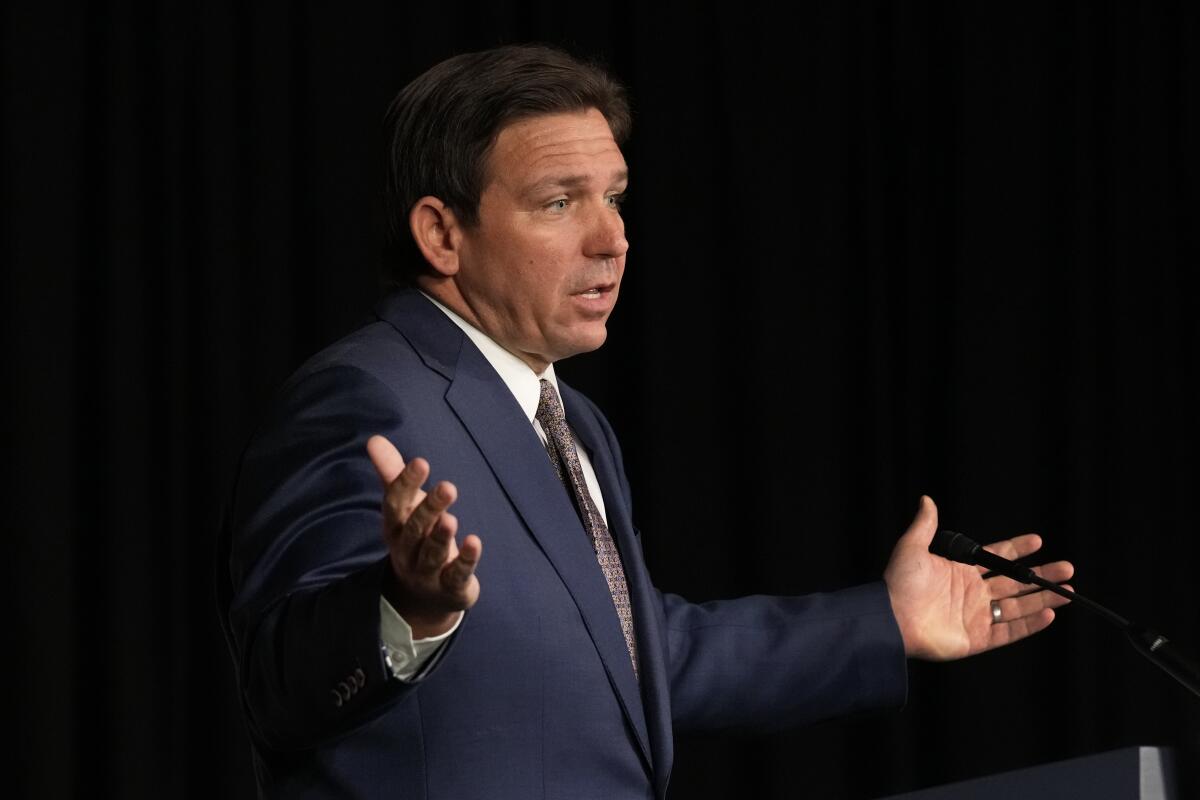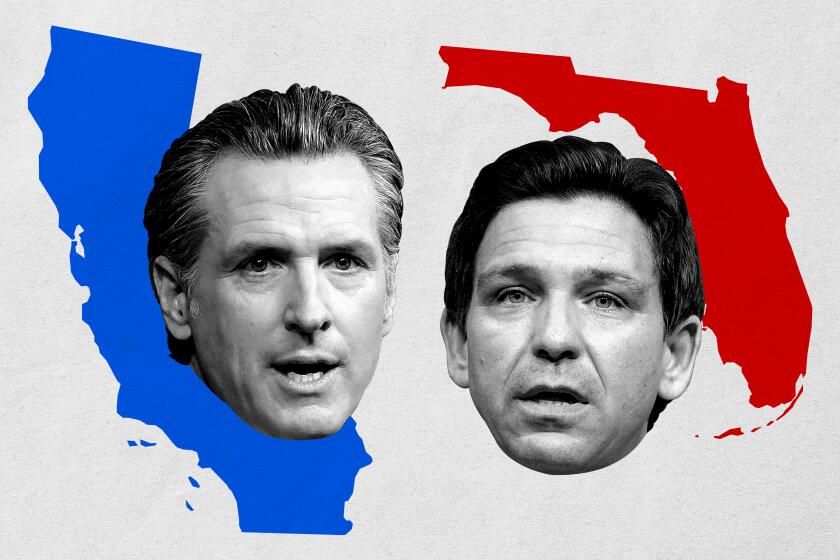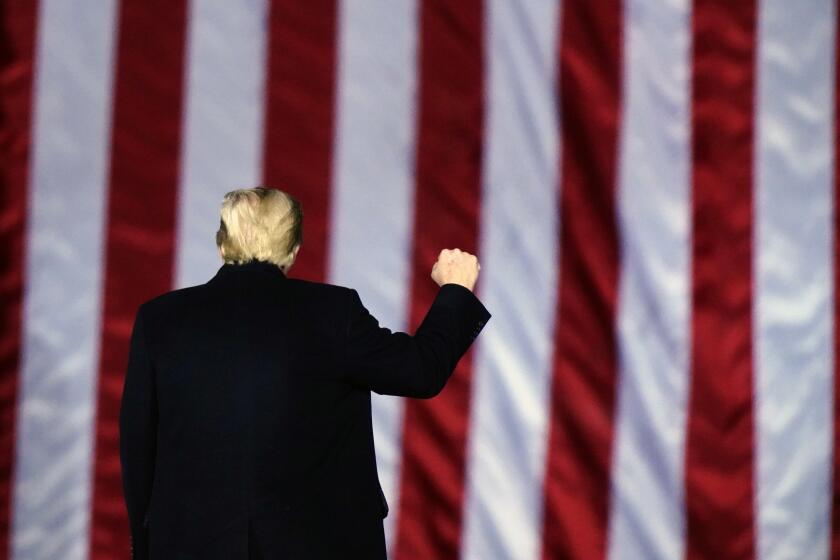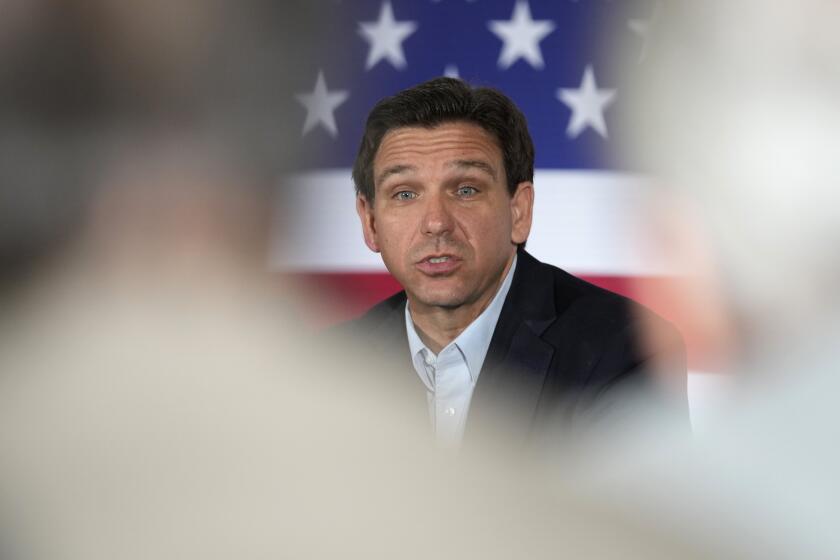Ron DeSantis ends presidential bid days before New Hampshire primary, endorses Trump

- Share via
MANCHESTER, N.H. — Florida Gov. Ron DeSantis suspended his campaign for the Republican presidential nomination Sunday, ending a bid that began as the best-funded and most high-profile challenge to former President Trump but fizzled over the course of a year.
He endorsed Trump, saying in a video posted to social media that it was now clear that “a majority of Republican primary voters want to give Donald Trump another chance.”
DeSantis said he and his team had “prayed and deliberated” about how to move forward after he finished a distant second in last week’s Iowa caucuses.
“I can’t ask our supporters to volunteer their time and donate their resources if we don’t have a clear path to victory,” DeSantis added. “Accordingly, I am today suspending my campaign.”
“Fire sale on all Ron DeSantis merch today!” Gov. Gavin Newsom, who predicted DeSantis would not be the Republican nominee when the pair debated on Fox News in November, gleefully wrote on X, formerly Twitter.
How do California and Florida stack up on crime, the economy, housing, homelessness and free speech? Our reporters examine the statistics, talk to the experts and report the facts.
DeSantis received 21.2% of the vote in Iowa, well behind Trump’s 51% and just two points ahead of former South Carolina Gov. Nikki Haley, who won 19.1%.
DeSantis said he disagreed with Trump over his handling of the pandemic and his “elevation” of chief medical advisor Dr. Anthony Fauci, but argued that the former president “is superior to the current incumbent, Joe Biden.”
In a visit to his New Hampshire campaign headquarters Sunday afternoon, Trump acknowledged the endorsement from DeSantis, whom he called a “very capable person.”
“Without the endorsement, I think we would have gotten almost all of those votes because we have very similar policies — strong borders, great education, low taxes, very, very few regulations,” Trump said.
In his farewell video, DeSantis also took a dig at Haley, who has steadily risen in the polls.
“We can’t go back to the old Republican guard of yesteryear, a repackaged form of warmed-over corporatism that Nikki Haley represents,” DeSantis said.
“He ran a great race, he’s been a good governor, and we wish him well,” Haley said at a New Hampshire event Sunday afternoon, minutes after DeSantis exited the race. “Having said that, it’s now one fella and one lady left. … All the fellas are out except for this one. And this comes down to, what do you want? Do you want more of the same or do you want something new?”
Ron DeSantis made his name on culture war issues. But the new presidential candidate’s healthcare record includes running one of the least-insured states in America.
DeSantis’ sudden departure from the contest effectively makes Tuesday’s New Hampshire primary a head-to-head battle between Haley and Trump. But DeSantis, several other Republican dropouts and a collection of lesser-known candidates will all still appear on Tuesday’s ballot.
Haley has staked her campaign on the Granite State, hoping to slow the Trump juggernaut by winning over moderate New Hampshire voters. Polling over the last two months showed her gaining on the former president, and by early January she appeared to be within striking distance. But after her less-than-impressive showing in Iowa last week, Haley’s New Hampshire outlook began to look grimmer.
Earlier on Sunday, the closely watched Suffolk University/NBC 10 Boston/Boston Globe tracking poll had Trump finishing with 55% of the vote to Haley’s 36%. In the same poll released Sunday, DeSantis was a distant third, polling at just 6%. Even if all DeSantis voters switched to Haley, the shift would not be enough to eliminate Trump’s lead.
DeSantis’ decision to drop out will not greatly benefit Haley, said Dante Scala, a political science professor at the University of New Hampshire.
“It makes the hill even steeper,” he said. “Most of those DeSantis voters are not going to Haley. Some will stay with DeSantis anyway. Of those remaining, I’ve got to think the split will favor Trump. That makes things a little steeper for Haley on Tuesday.”
Scala marveled at how quickly Trump appeared to be securing the GOP nomination. “How rapidly Trump is wrapping things up is remarkable,” Scala said.
“It’s been over from Day 1 and it just takes some of these knuckleheads time to figure out they never had a shot in the first place,” Ray Buckley, the chair of the New Hampshire Democratic Party, said in an interview. “Trump’s margin is growing by the hour and he’s going to have a blowout on Tuesday.”
A year ago, DeSantis appeared to represent a formidable challenge to Trump and surpassed him in many polls of potential Republican primary voters.
A mid-February UC Berkeley IGS/Los Angeles Times poll of California Republicans, for example, found DeSantis leading Trump 37% to 29% in the state, which sends the largest delegation to the Republican National Convention. At the time, Republicans were still smarting from the defeats they suffered in the 2022 midterm elections, which many in the party blamed on Trump, and many voters were open to DeSantis’ argument that he could offer Trump-like policies without the attendant baggage.
Has Biden’s standing in the state improved at all? How does Vice President Harris stand? And how much support does RFK Jr. pull (and from whom) in a general election matchup?
But the strength of that argument waned as memories of the midterm losses began to fade. At the same time, three other developments undermined DeSantis’ hopes: Criminal indictments of Trump caused many Republican voters to rally around the former president; Biden’s standing in polls started to slip, blunting the argument that Republicans needed someone other than Trump to defeat the incumbent; and Trump pummeled DeSantis with attacks that the Florida governor largely left unanswered, fearing that attacking back would alienate the Trump supporters he needed.
When DeSantis was riding high, polls showed that much of his support came from Republicans skeptical of Trump — college-educated voters and more moderate Republicans who disliked the former president’s style and some of his policies. But DeSantis aimed his appeals primarily at Trump’s core supporters, who make up the largest part of the Republican primary electorate. For a brief time, that approach appeared to work — conservative voters were attracted to DeSantis because of his issue stands and his pugnacious attacks on liberals and culture-war targets, while moderates saw him as the best bet to beat Trump.
But the strategy only worked so long as DeSantis seemed to be beating Trump. Once his poll numbers started to decline, many of those moderate voters pulled away. Meantime, most conservatives seemed uninterested in anyone other than Trump.
That set in motion a downward spiral that DeSantis proved unable to reverse. Between January and July, he lost roughly half his support in the average of national polls maintained by FiveThirtyEight, a polling aggregator. In California, Trump retook the lead by mid-May and never relinquished it.
Over the course of the fall, DeSantis’ aides fought bitterly — sometimes publicly — over strategy, and the candidate often appeared to be flailing as he sought a way forward. DeSantis’ campaign was plagued by a series of blunders, starting with his campaign launch, which took place on Twitter and was interrupted by technical problems.
Candidates in both parties have run into trouble by catering to their online audience while neglecting the concerns of the less politically engaged majority.
Jason Roe, a top DeSantis supporter who helped lead Mitt Romney and Marco Rubio’s presidential bids, said the Florida governor’s media strategy and unwillingness to trust advisors outside his Florida circle led to his downfall. Roe also said the campaign should have focused more on fundraising and communications.
“The campaign never found its footing,” said Roe, who also served as strategist for San Diego Mayor Kevin Faulconer. “The rollout was clunky, the restarts were clunky. I think Trump brilliantly bracketed everything they tried to do to find their sea legs. Once [Trump] got indicted, I think that made him unstoppable.”
A former staffer at Never Back Down, the super PAC that formed the backbone of DeSantis’ campaign, was deeply disappointed by the Florida governor’s decision to drop out. But the person, who was granted anonymity to speak candidly, questioned the organization’s decision to hire staff in Super Tuesday states, including California and Texas, before it was clear that DeSantis could survive the early-state contests.
“He’s amazing. He did the 99 counties,” the staffer said, referring to DeSantis’ barnstorming of Iowa. “He’s not lazy. He’s a hard worker. I truly wish he was the guy.”
More to Read
Get the L.A. Times Politics newsletter
Deeply reported insights into legislation, politics and policy from Sacramento, Washington and beyond. In your inbox twice per week.
You may occasionally receive promotional content from the Los Angeles Times.















